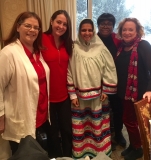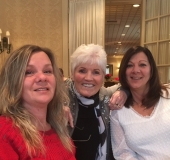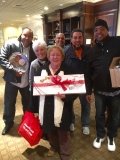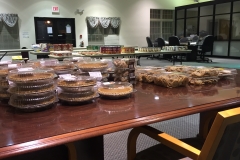“My Medicaid, My Life” by Alice Wong, New York Times — Opinion/Disability Section, May 3,2017
I am a Medicaid welfare queen. When Republicans talk about safety net programs like Medicaid, Social Security and food stamps, they evoke images of people like me gabbing on their smartphones, eating steak and watching TV from the comfort of home. Political rhetoric and media coverage paints us as unmotivated and undeserving individuals, passive consumers of taxpayer dollars who are out to “game the system,” taking resources away from hard-working people.
The reality of being a disabled person on Medicaid is far more complex and nuanced. Many people do not even know the difference between Medicaid and Medicare and simply consider them “entitlement programs,” as if tax breaks and corporate subsidies aren’t entitlements by another name. Medicaid is more than a health care program. It is a life-giving program.
Like the thousands of people sharing their stories at town halls about how the Affordable Care Act saved their lives, I am sharing my Medicaid story to illustrate its value and the potential consequences of “reform.”
I am an Asian-American woman with a disability and a daughter of immigrants. When I turned 18, my dad told me that I needed to make an appointment at the county office and apply for Medicaid. Living in an affluent suburb of Indianapolis, I was indignant. Medicaid was for “those people,” the “indigent.” I learned that my parents paid exorbitant monthly premiums for my health care. Only one company in our state would cover me because of my pre-existing condition (spinal muscular atrophy, a congenital motor neuron disease). I had no idea of the financial pressure placed on our family for basic health insurance because of my disability.
I graduated from high school in 1992, two years after the Americans With Disabilities Act was passed. Learning about disability history and realizing I was a member of a protected class encouraged me to imagine and create the life that I want. Once I got over myself and realized I had a right to Medicaid, it made a difference immediately.
I began to receive several hours a week of services to help me with personal care. When I went away to college I was able to hire attendants and live independently for the first time. It was an exhilarating taste of freedom that showed me a glimpse of what was possible. Before Medicaid, my family members, including my siblings, provided all of my care, including bathing, dressing and toileting. Now I had choices and the basic human right of self-determination.
Unfortunately, Indiana made cuts to Medicaid the following year that resulted in fewer hours of services. Our family couldn’t manage both tuition and private pay for personal care, so I made the heartbreaking decision to leave the school I loved and move back home.
As I commuted to a school nearby, I learned about the activism by disabled people that led to expanded accessibility and services across the country, California in particular. Moving to San Francisco for graduate school in the late 1990s afforded me the privilege of being in a state with a program that allows me to direct my own personal care services, including hiring and training my attendants. This program, In-Home Supportive Services (IHSS), is funded by a combination of local, state and federal funds. Without it, I wouldn’t have been able to go to school, work or volunteer.
By no means is it fun or easy receiving Medicaid. I follow strict eligibility rules and guidelines. I’ve been able to work as a researcher thanks to a state Medicaid Working Disabled Program where I can maintain eligibility by paying monthly premiums. Over time, my disability progressed and I needed substantial care that would normally take place in an institution if I didn’t have any help. I became eligible for additional hours of service through a Medicaid waiver so that I could remain in the community and stay out of a nursing home, at a considerable savings cost for the entire system.
When you are disabled and rely on public services and programs, you face vulnerability every day. This vulnerability is felt in my bones and my relationship with the state. Fluctuations in the economy and politics determine whether my attendants will receive a living wage and whether I’ll have enough services to subsist rather than thrive. The fragility and weakness of my body, I can handle. The fragility of the safety net is something I fear and worry about constantly.
Although the American Health Care Act — the Republican attempt to replace the Obama administration’s Affordable Care Act — failed, the assault on poor, disabled, sick and older people continues in other forms. The Centers for Medicaid and Medicare Services can weaken regulations, place limits on the services states provide without legislation and add new work requirements. States can request block grants and changes to eligibility and regulations from the federal government directly. Block grants and per capita limits will force states to reduce or eliminate services to make up the difference from the federal government, affecting millions of people.
“Program flexibility” is code for the decimation of Medicaid that will put lives like mine at risk. Some people with disabilities may have to live in nursing homes if community-based services wither away under this flexibility and reform. We cannot disappear again after a history of segregation and institutionalization. When Republicans talk about freedom and choice, they don’t realize that Medicaid gives those very things to people with disabilities.
This past March marked my 25th year of being a recipient of Medicaid. When I was young, I felt shame and embarrassment at being one of “those people” on benefits. Today I am unapologetically disabled and a fully engaged member of society. None of that would be possible without Medicaid.
Every day I resist forces that label me as the Other or a scapegoat for society’s problems. With the disability community, I share our stories and speak out against threats to our future by using my privilege and tools such as social media. I hope my story will continue for decades to come.



















